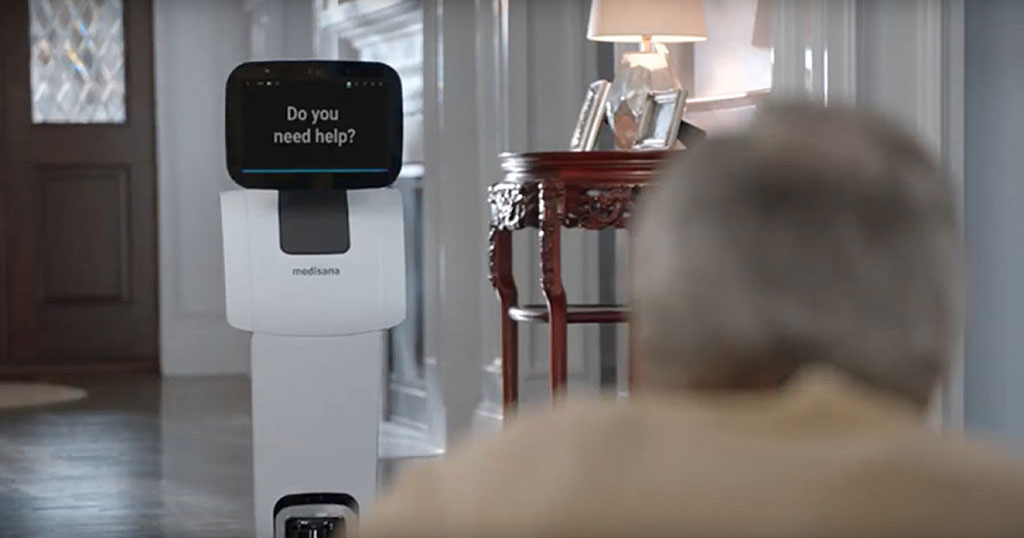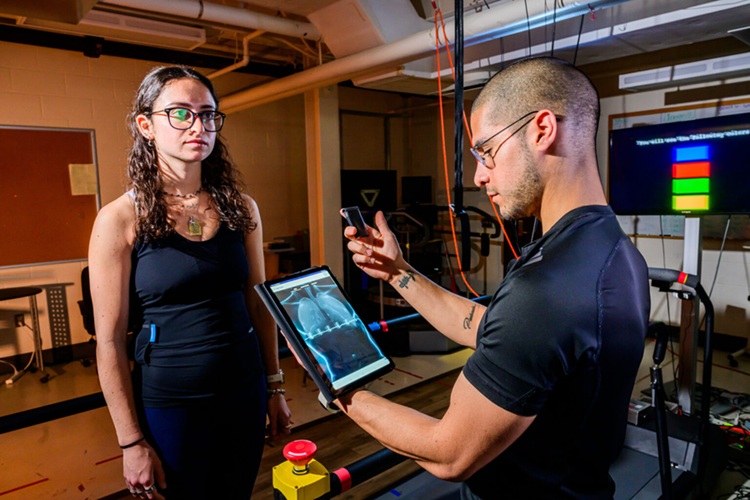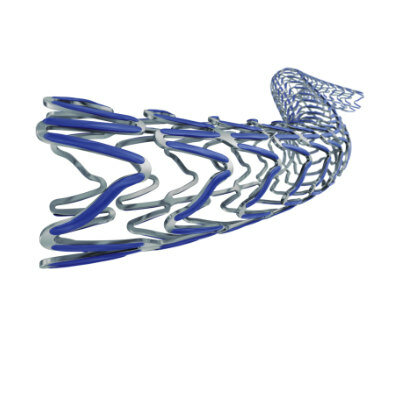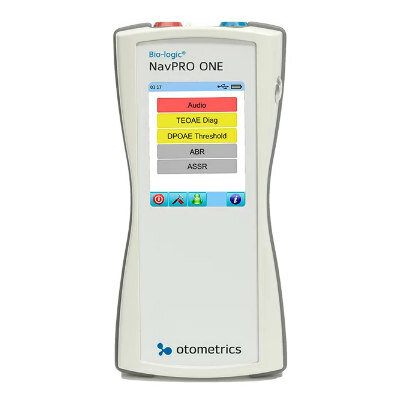Robotic Imaging Solution Detect Early COVID-19 Symptoms 
|
By HospiMedica International staff writers Posted on 02 Jun 2020 |

Image: Meditemi health robots can help detect COVID-19 symptoms (Photo courtesy of Meditemi)
An intelligent care robot provides a range of remote monitoring capabilities, including early detection of COVID-19 symptoms in under 10 seconds.
The new solution, a joint venture between Vayyar Imaging (Tel Aviv, Israel) and of Meditemi (Hong Kong), will equip Meditemi health robots with Vayyar's 4D intelligent radiofrequency (RF) sensors, which cover imaging and radar bands from 3-81Ghz, with up to 72 transceivers in each chip. When a person approaches the robot, standing within one meter of it, it performs a quick, touchless scan to analyze heart rate (BPM), respiratory rate (RPM), BPM and RPM waveforms, and temperature. The robot's dashboard then displays key vital signs in real-time, and a concomitant COVID-19 infection risk level.
The intelligent robots can function in any environmental condition, unaffected by line-of-sight, lighting or weather conditions, bringing a holistic COVID detection solution to the community that can restore confidence by providing a fast, automatic screening process in any public space, for example in building entrances, factories, public transport, airports, trade shows and border crossings. Zero staff involvement or sanitation requirements are involved. In addition, Meditemi robots will enable seniors monitoring in their residences and alert caregivers of emergency situations (such as falls) or health deterioration.
“Vayyar's multi-antenna sensor produces unprecedented levels of accuracy, enabling high-resolution 4D point-cloud images. Vayyar is developing the next generation of sensing technology that is miniature, affordable and versatile enough to impact everyone's lives,” said Ofer Familier, General Manager of Vayyar Home. “Following successful collaborations with Israel's Ministries of Defense and Health, we are thrilled to be coupling our health sensor technology with Meditemi to provide solutions to bring people back to work and also help monitor our parents and grandparents at their homes.”
“Meditemi robot together with Vayyar technology will help doctors and nurses in providing treatment and giving advice to patients without touching or getting close to the patient, in order to reduce virus infection risks for medical personnel,” said Rafael Aviram, President and CEO of Meditemi.
The rapidly ageing population is bringing new challenges to society worldwide. Care institutions and hospitals are facing serious staffing shortages, as fewer and fewer people choose to become healthcare professionals, while at the same time the number of people suffering from morbidities is constantly on the rise.
Related Links:
Vayyar Imaging
Meditemi
The new solution, a joint venture between Vayyar Imaging (Tel Aviv, Israel) and of Meditemi (Hong Kong), will equip Meditemi health robots with Vayyar's 4D intelligent radiofrequency (RF) sensors, which cover imaging and radar bands from 3-81Ghz, with up to 72 transceivers in each chip. When a person approaches the robot, standing within one meter of it, it performs a quick, touchless scan to analyze heart rate (BPM), respiratory rate (RPM), BPM and RPM waveforms, and temperature. The robot's dashboard then displays key vital signs in real-time, and a concomitant COVID-19 infection risk level.
The intelligent robots can function in any environmental condition, unaffected by line-of-sight, lighting or weather conditions, bringing a holistic COVID detection solution to the community that can restore confidence by providing a fast, automatic screening process in any public space, for example in building entrances, factories, public transport, airports, trade shows and border crossings. Zero staff involvement or sanitation requirements are involved. In addition, Meditemi robots will enable seniors monitoring in their residences and alert caregivers of emergency situations (such as falls) or health deterioration.
“Vayyar's multi-antenna sensor produces unprecedented levels of accuracy, enabling high-resolution 4D point-cloud images. Vayyar is developing the next generation of sensing technology that is miniature, affordable and versatile enough to impact everyone's lives,” said Ofer Familier, General Manager of Vayyar Home. “Following successful collaborations with Israel's Ministries of Defense and Health, we are thrilled to be coupling our health sensor technology with Meditemi to provide solutions to bring people back to work and also help monitor our parents and grandparents at their homes.”
“Meditemi robot together with Vayyar technology will help doctors and nurses in providing treatment and giving advice to patients without touching or getting close to the patient, in order to reduce virus infection risks for medical personnel,” said Rafael Aviram, President and CEO of Meditemi.
The rapidly ageing population is bringing new challenges to society worldwide. Care institutions and hospitals are facing serious staffing shortages, as fewer and fewer people choose to become healthcare professionals, while at the same time the number of people suffering from morbidities is constantly on the rise.
Related Links:
Vayyar Imaging
Meditemi
Latest Health IT News
- Printable Molecule-Selective Nanoparticles Enable Mass Production of Wearable Biosensors
- Smartwatches Could Detect Congestive Heart Failure
- Versatile Smart Patch Combines Health Monitoring and Drug Delivery
- Machine Learning Model Improves Mortality Risk Prediction for Cardiac Surgery Patients
- Strategic Collaboration to Develop and Integrate Generative AI into Healthcare
- AI-Enabled Operating Rooms Solution Helps Hospitals Maximize Utilization and Unlock Capacity
- AI Predicts Pancreatic Cancer Three Years before Diagnosis from Patients’ Medical Records
- First Fully Autonomous Generative AI Personalized Medical Authorizations System Reduces Care Delay
- Electronic Health Records May Be Key to Improving Patient Care, Study Finds
- AI Trained for Specific Vocal Biomarkers Could Accurately Predict Coronary Artery Disease
Channels
Critical Care
view channel
Novel Intrabronchial Method Delivers Cell Therapies in Critically Ill Patients on External Lung Support
Until now, administering cell therapies to patients on extracorporeal membrane oxygenation (ECMO)—a life-support system typically used for severe lung failure—has been nearly impossible.... Read more
Generative AI Technology Detects Heart Disease Earlier Than Conventional Methods
Detecting heart dysfunction early using cost-effective and widely accessible tools like electrocardiograms (ECGs) and efficiently directing the right patients for more expensive imaging tests remains a... Read more
Wearable Technology Predicts Cardiovascular Risk by Continuously Monitoring Heart Rate Recovery
The heart's response to physical activity is a vital early indicator of changes in health, particularly in cardiovascular function and mortality. Extensive research has demonstrated a connection between... Read more
Wearable Health Monitoring Device Measures Gases Emitted from and Absorbed by Skin
The skin plays a vital role in protecting our body from external elements. A key component of this protective function is the skin barrier, which consists of tightly woven proteins and fats that help retain... Read moreSurgical Techniques
view channel
Intravascular Imaging for Guiding Stent Implantation Ensures Safer Stenting Procedures
Patients diagnosed with coronary artery disease, which is caused by plaque accumulation within the arteries leading to chest pain, shortness of breath, and potential heart attacks, frequently undergo percutaneous... Read more
World's First AI Surgical Guidance Platform Allows Surgeons to Measure Success in Real-Time
Surgeons have always faced challenges in measuring their progress toward surgical goals during procedures. Traditionally, obtaining measurements required stepping out of the sterile environment to perform... Read moreHealth IT
view channel
Printable Molecule-Selective Nanoparticles Enable Mass Production of Wearable Biosensors
The future of medicine is likely to focus on the personalization of healthcare—understanding exactly what an individual requires and delivering the appropriate combination of nutrients, metabolites, and... Read more
Smartwatches Could Detect Congestive Heart Failure
Diagnosing congestive heart failure (CHF) typically requires expensive and time-consuming imaging techniques like echocardiography, also known as cardiac ultrasound. Previously, detecting CHF by analyzing... Read moreBusiness
view channel
Expanded Collaboration to Transform OR Technology Through AI and Automation
The expansion of an existing collaboration between three leading companies aims to develop artificial intelligence (AI)-driven solutions for smart operating rooms with sophisticated monitoring and automation.... Read more

















